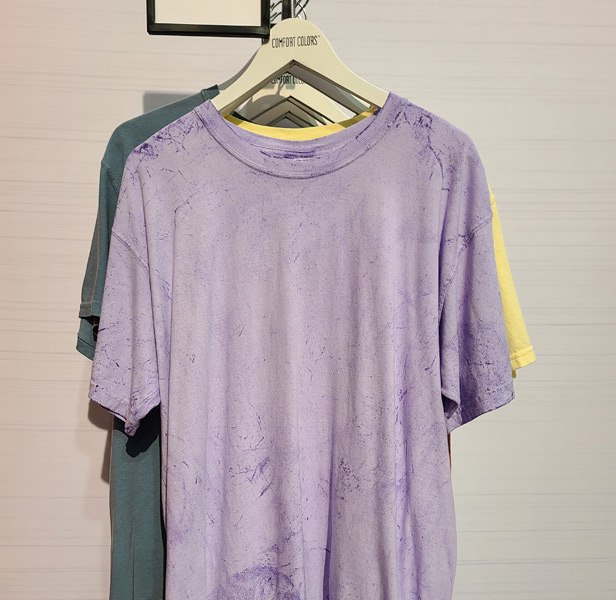Product Hub March 25, 2022
4 Trends From Impressions Expo Atlantic City
Pastel garment washes and loose-fitting heavyweight hoodies were among the sights at the show geared toward apparel decorators.
There were plenty of apparel and decorating trends on display at the Impressions Expo in Atlantic City, held at the convention center from March 24 to 26. Retro, ’90s-inspired styles and soft pastels filled the booths, and quite a few decorating equipment companies were featuring direct-to-film heat transfer technology. Here are a few trends from the show.
1. Room for Comfort
@theresahegel_asi Milissa Clark of Lane Seven Apparel shows off a few hot Apparel Trends at Impressions Expo Atlantic City. #FashionTrends #90saesthetic #pastel ♬ original sound - Theresa Hegel
Athleisure continues to be popular, particularly baggier fits that provide ample comfort. Suppliers presented off an abundance of hoodies, sweatpants, flowing tank tops and sublimation-friendly tech tops.
John Parks of BAW Athletic Wear (asi/37689) attributes the popularity of his company’s extreme tech polyester line to Under Armour. “The company created a loose-fit fabric craze,” he said. “And then people found out that they can make similar products at much more competitive prices and have them in stock.”
Heavyweight T-shirts and hoodies are also gaining steam, thanks to the enduring popularity of the ’90s in online influencer culture, according to Milissa Clark of Lane Seven Apparel Trading (asi/66246). Heavier fabrics are also a form of armor as people return to the outside world, she added. “After everything we’ve gone through with COVID, people are needing something to kind of give them some security,” Clark said.
2. Garment Wash Is the New Tie-Dye

Garment-washed tees are the next evolution of the tie-dye trend that’s been popular the last few seasons.
The last few years, tie-dye – particularly in a muted color palette – has been popular, but there’s some evidence that the seemingly ubiquitous trend is evolving. Garment washes and pigment dyes that give apparel a textural, lovingly worn look are taking over where tie-dye left off. “People want that lived-in feel right off the bat,” Clark said.
Pastels and soft “coastal colors” continue to be more in demand than saturated jewel tones.
3. ‘No More Broken Needles’
@theresahegel_asi Susie from FlexFit talks about a new cap ideal for embroiderers that gets rid of the center seam, so "No more broken needles." #TruckerCaps #FlexFit #Embroidery #ImpressionsExpo ♬ original sound - Theresa Hegel
Suppliers also showed off apparel features designed to make the decoration process, well, seamless. Susie Chai of Flexfit introduced a new cap designed to make embroidery easier: The front panels have no center seam, and the design is thinner, with three layers of fabric, rather than six. “No more broken needles for embroiderers,” Chai said. “It’s better for them, and people really like it.”
Clark of Lane Seven presented a hoodie from the supplier’s urban collection with no drawcord and an extra-large imprint area across the front. The seam on the hood only extends three-quarters of the way to allow for imprinting on the hood as well. The sweatpants have a back pocket that allows for embroidery, and no side seams, allowing for imprinting down the legs.
4. Direct-to-Film Dominates
@theresahegel_asi A "quick" tutorial at Impressions Expo Atlantic City from Equipment Zone on how to make a direct-to-film heat transfer with an Epson DTG printer. #HeatTransfer #ApparelDecoration #DTF #DTG ♬ Blue Blood - Heinz Kiessling & Various Artists
Direct-to-film heat transfers continue to be popular. Stahls’ (asi/88984) has been highlighting its UltraColor MAX transfers at trade shows all year. “It’s a borderless transfer that’s fully digital, which means we can do unlimited color and really fine detail with no outline,” said Josh Ellsworth, Stahls’ executive vice president of sales and marketing.
At Impressions Expo, Omar Esquivel of Equipment Zone, a reseller of Epson apparel decoration machines, demonstrated how to create a direct-to-film transfer using an Epson SureColor direct-to-garment printer. While DTG typically works best on cotton apparel, direct-to-film allows for a wider spectrum of possibilities. “You can transfer pretty much on anything, hats, umbrellas, polyester,” Esquivel said. The process of creating a film involves printing on transfer paper, sprinkling it with a glue powder, then setting the design with a heat press. “When you’re ready to use them, you can just grab a film and apply to the garment with a heat press,” Esquivel added.

Product Hub
Find the latest in quality products, must-know trends and fresh ideas for upcoming end-buyer campaigns.
